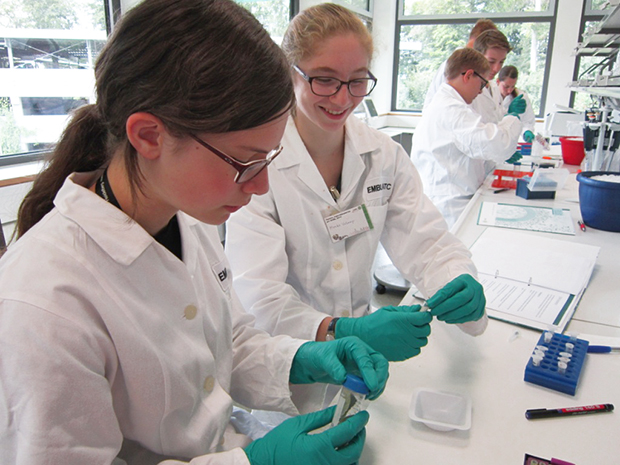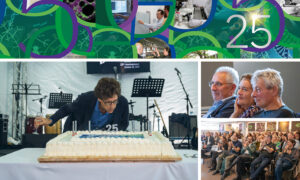
Scientists for a day
For just one day, PhD students could no longer claim the title of ‘youngest researchers’ at EMBL. That honour went to the 13 students aged 11 to 17 who conducted a full-day experiment in the EMBL training labs as part of the Tschira-Jugendakademie at the end of August this year.

Initially created as a one-time ‘summer camp’ programme, the Tschira-Jugendakademie is a project of the Klaus Tschira Stiftung, a German foundation that supports natural sciences, mathematics and computer science. The Tschira-Jugendakademie owes its existence to Nina Schaller, a former researcher at the University of Heidelberg. Honoured with an award for ‘understandable science’ by the Klaus Tschira Stiftung in 2009, she was inspired to create a curriculum that would immerse youngsters in a wide range of biological disciplines for five days at a time. “My idea was to teach the kids things that they wouldn’t otherwise have access to, and do really awesome, hands-on projects with full-time biologists,” says Schaller.
The first session ran during the summer of 2011, and it was so successful that all of the nearly 70 students who participated wanted to do it again. In the three years since its inception, the Tschira-Jugendakademie has grown from a one-week course into a cycle of four different week-long curricula, and has partnered with a variety of research and education institutions to provide the experts and environments that make the programme such a success, including the University of Heidelberg, Senckenberg Museum in Frankfurt, the Heidelberg Zoo and the Haus der Astronomie.
Life science learning
EMBL has a longstanding tradition of providing training courses for science teachers through its European Learning Laboratory for the Life Sciences (ELLS). Its goal is to provide continuing professional development to secondary school science teachers, onsite at EMBL Heidelberg, at our outstations and at research institutions in our member states that are interested in adopting its successful model. In addition, ELLS runs a School Ambassadors Programme and offers interactive webinars, e-learning modules and more teaching resources via its ‘EMBLog’ website. Linking teachers with EMBL scientists and providing opportunities to learn about the latest developments in the life sciences – so that teachers can pass that knowledge on to their students – is a hallmark of ELLS activities.
This was a real research project for the students; the result was unknown to any of us
In spring, Head of ELLS Philipp Gebhardt met with Schaller, who had been impressed with the Lab’s facilities during previous visits organised by Angela Michel in EMBL’s communications and outreach team. Schaller hoped to incorporate additional hands-on research experience in the summer 2014 course, and thanks to earlier tours and engaging talks by some of EMBL’s young scientists, she thought that EMBL would be a perfect fit. “Normally we don’t have the manpower to offer that kind of programme for students, but it just so happened that we were developing a new DNA barcoding course at the time,” says Gebhardt. DNA barcoding – a relatively new method to identify species by using short genetic markers – complemented the Tschira-Jugendakademie’s fourth-level ‘Future Now’ curriculum, and the ELLS team was interested to test its new course plan on a student group. Moreover, the Tschira-Jugendakademie students had left a similarly positive impression on Gebhardt in previous years, and so ELLS offered to host three one-day courses.
Opening doors and eyes
Thirteen students spent the full day experiencing what it’s like to be a scientist. They wore lab coats and sterile gloves, extracted DNA from living matter, performed polymerase chain reaction (PCR), and prepared samples for analysis – activities that are beyond many schools’ resources. “The students were able to work with very technical equipment and very knowledgable people, which was not only eye-opening but also mentally stimulating,” says Rikk Villa, who accompanied the group to EMBL. “That’s really what we’re trying to achieve in the Tschira-Jugendakademie: to open doors for them to spaces that they have not previously experienced, where they feel the fascination of entering a new world. EMBL was a perfect fit for us, and the whole day was a complete success.”
Gebhardt, who co-facilitated, agrees: “This was a real research project for the students, because we gave them two different DNA extraction protocols from plant tissue and wanted to know which one worked better; the result was unknown to any of us. So the students got to be real scientists for a day, and we got valuable information about how to make our module better – it’s a complementary arrangement.”
This year’s remaining two courses will continue to test and refine the DNA barcoding methods, while providing the students with a rare chance to conduct research in a truly professional environment. “The kids say they like the course because they’re treated like adults, like people who have a voice and intelligence that’s valuable,” concludes Schaller. “That’s why the Tschira-Jugendakademie exists, and why we hope it will continue into the future.”


